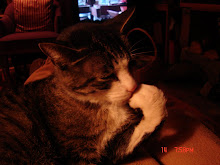I have not yet discussed Tante Betsy. She was a cousin of my Opa and my Oma's best friend. Tante Betsy was a very distinguished and educated lady who was raised in a privileged Jewish family. I have almost no knowledge of my grandfather's family because he died before I was born. Thus I don't know anything about the Jewish connection. I do know that she played a huge role in helping my Oma provide for her children once she was widowed. Tante Betsy funded the post secondary educations for both Ina and Jo. She also settled the equivalent amount on my father when he married.
I remember her as dignified and aloof. She would visit Oma weekly and the two old friends would sit huddled over tea by the hearth deep in conversation. They clearly loved one another.
Did I mention she was Jewish? It was 1940, and the Nazis occupied Holland. As the occupation tightened its grip, life became incredibly dangerous for the Jews. It was decided that we would hide Tante Betsy. She first stayed with Oma at the flat on the Hazelaarstraat. It was a very large flat with a large central hall and bedrooms, living room, kitchen and dining room radiating out from the central hall. There was room to hide Tante Betsy but as the fuel got scarcer, the only rooms being heated were the living and dining rooms. This threw the old friends together too much and cracks began to appear in their friendship. Tante Betsy was accustomed to servants. Oma was not prepared to wait on her. Tante Betsy was supposed to be invisible but she couldn't grasp that. Both women were strong willed and independent. They began to bicker and Oma resented the invasion of her home by someone who couldn't grasp the danger her presence brought. Tante Betsy would bemoan the luxuries lost to her in Oma's house. It was clear that Tante Betsy needed a new hiding place. The stress on the two friends placed them both at risk.
My father moved Tante Betsy to our much smaller flat in the interim. This was unworkable for my mother who Tante Betsy ordered around like a parlor maid. The Nazis began sweeping neighborhoods in their periodic roundups of men of working age. The intent was to send the men to labour camps, but if they found Jews, they would kill them and those hiding them. It was imperative that a new safer hiding place be found for Tante Betsy. Through resistance contacts, a safe house was found in Arnhem (near the German border) and arrangements were made for her move. She cried and pleaded with my father to let her stay and not send her to strangers. The whole family was very upset, but she had to go. She was safely hidden in Arnhem and my father ensured that she received what she needed.
All went well until the Battle of Arnhem, when the Canadians launched an air/ parachute attack behind enemy lines, on the Germany border. They lost. Arnhem was inundated with German soldiers. There was absolutely no news about Tante Betsy and no way of getting any. The Hogenkamps experienced much collective guilt and helplessness. My father beat himself up endlessly for sending her to Arnhem.
As it turned out, hiding her in the midst of a battle hot spot, was a very good move. The Germans were much too busy fighting to be searching for Jews. So, after May 5, 1945, the liberation of Holland, we got the news that Tante Betsy was alive. She came back to Den Haag, resumed her life including regular visits with my Oma. The experience had humbled her and she was well aware of her good fortune. Her niece, on the other hand, was picked up and deported to a concentration camp where she disappeared.
The good old friends never reproached each other for stresses they had endured during those terrifying months.
skip to main |
skip to sidebar

Facebook Badge
About Me

- kingmisha
- I'm bigger than a pile of breadboxes, but smaller than a Sherman tank. I'm overeducated, underpaid but very content with my life. I have loved infrequently but intensely. I dated a poet, divorced a Dean, had an affair with a jazz pianist, was engaged to a diplomat, and widowed by my child's father. The men in my life were all very special. Not all grand passions but much loved in their time: Leonard Cohen, Alfred Pinsky, Billy Horn, Wendell Goodin, and Elliot Hirschman. Thanks for the memories... I'm a lapsed artist which doesn't really trouble me because I'm a very successful parent. I lacked the requisite conceit to persevere as an artist. I just couldn't make myself believe that my art came before my child. The world really doesn't need another sculptor (even a good one), but it does need another good human being. It can use all the good human beings we can turn out. I present Mambolica as my evidence so judge for yourselves.